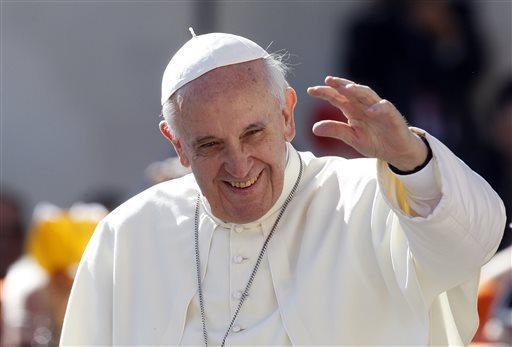Pope Outlines Hopes for Church Reform
By Nicole Winfield
VATICAN CITY — Pope Francis says he doesn't want a "Vatican-centric" church concerned about itself but a missionary church that reaches out to the poor, the young, the elderly and even to non-believers. That's the vision he laid out as he opened a landmark meeting Tuesday on reforming the 2,000-year-old institution. Francis convened the inaugural meeting of his eight cardinal advisers for three days of brainstorming on revamping the antiquated Vatican bureaucracy and other reforms. The move fulfills a key mandate of the cardinals who elected him: They wanted a pope who would involve local church leaders in helping make decisions about the 1.2-billion strong church. The closed-door meeting got underway against the backdrop of one of the most tangible signs that change is already afoot: The secretive Vatican bank, under investigation for alleged money-laundering by Italian prosecutors, released its first-ever annual report Tuesday, the latest step toward financial transparency championed by Francis and his predecessor Benedict XVI. Net earnings at the bank, known as the Institute for Religious Works, rose more than four-fold to 86.6 million euros ($116.95 million) in 2012, the report said. More than 50 million euros of that was given to the pope for his charitable works. Francis has put the Vatican bank on notice, forming a commission of inquiry to look into its activities amid accusations by Italian prosecutors that its clients may have used its lax controls to launder money. The bank's two top managers have already resigned and a Vatican monsignor has been arrested after trying to smuggle 20 million euros into Italy from Switzerland without declaring it at customs. Francis has formed another commission of inquiry to look into the Vatican's overall financial health, but his decision to name the eight cardinals from around the world as a permanent advisory panel represents the most significant sign that he wants to shake things up at the Vatican. No decisions are expected this week and Francis himself has said the reform process will take time. The eight cardinals include Sean O'Malley, the archbishop of Boston and a longtime friend of Francis; Cardinals Oswald Gracias, archbishop of Mumbai, India; Laurent Monsengwo Pasinya, archbishop of Kinshasa, Congo; and Reinhard Marx, archbishop of Munich and Freising, Germany, all of whom head bishops conferences in their regions. It's unclear how this parallel cabinet will work with the outdated Vatican bureaucracy that constitutes a pope's primary cabinet, known as the Vatican Curia. A scandal over leaked papal documents last year showed the Curia to be a dysfunctional warren of political infighting and turf battles, fueling calls for reform from the cardinals. On the same day the inaugural "Group of Eight" meeting started, Rome daily La Repubblica published a lengthy interview with Francis, in which he denounced the "Vatican-centric" nature of the Holy See administration and acknowledged that popes in the past had been infatuated with the pomp of the Vatican. "Heads of the church have often been narcissists, flattered and thrilled by their courtiers," Francis said. "The court is the leprosy of the papacy." For someone who has said he abhors giving interviews, Francis has made himself remarkably amenable to taking questions about his faith and vision for the church. The pope also explained his affinity for his namesake St. Francis, whose tomb he will visit Friday in Assisi, the hilltop town where St. Francis preached his gospel of poverty and caring for the most destitute. Francis said he wanted a missionary church just like that: "We need to give hope to young people, help the aged and open ourselves toward the future and spread love." He said the Second Vatican Council, the 1962-65 meetings that brought the church into the modern world, had promised such an opening to people of other faiths and non-believers but the church hadn't made progress since then. "I have the humility and ambition to do so," he said. During the interview, Francis showed his wry sense of humor — there was talk about the pope and his atheist interviewer trying to convert one another — but also his very human fears right after he was elected, when he said he was "seized by a great anxiety." "To make it go away and relax, I closed my eyes and made every thought disappear, even the thought of refusing to accept the position, as the liturgical procedure allows," he recounted. "At a certain point I was filled with a great light. It lasted a moment, but to me it seemed very long. Then the light faded, I got up suddenly and walked into the room where the cardinals were waiting." He said he signed the acceptance form and went out on the balcony to be introduced to the world as Pope Francis.
|
.
Any original material on these pages is copyright © BishopAccountability.org 2004. Reproduce freely with attribution.
